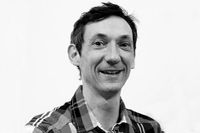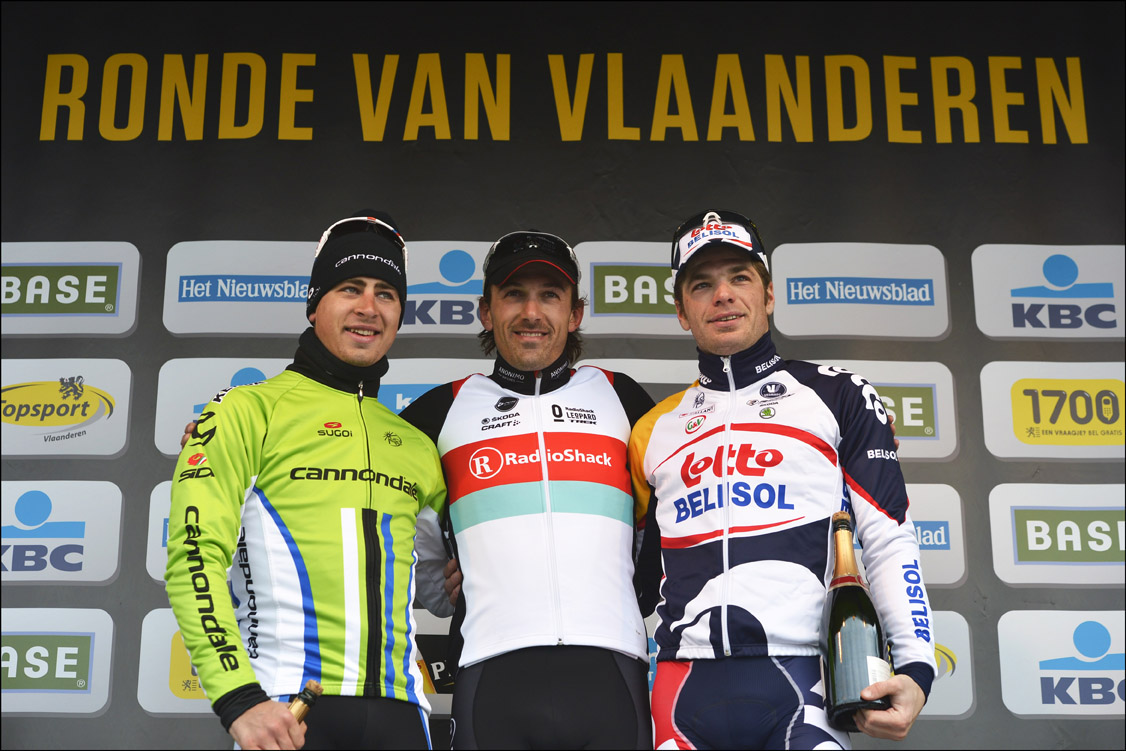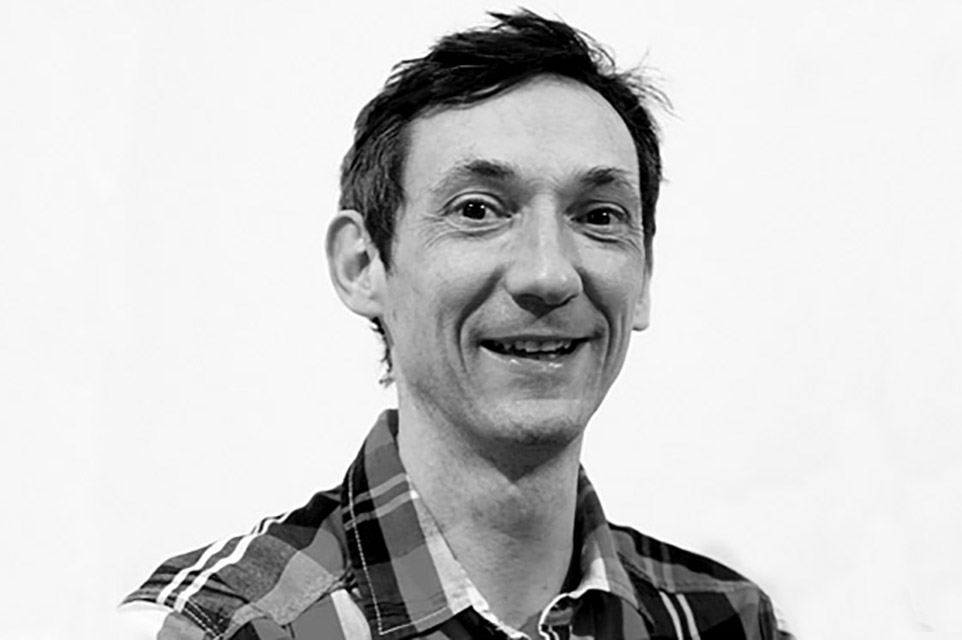RadioShack celebrate biggest win at Tour of Flanders


Peter Sagan, Fabian Cancellara and Jurgen Roelandts on the podium after the 2013 Tour of Flanders
By Richard Moore
By the RadioShack bus in the centre of Oudenaarde Dirk Demol embraced Luca Guercilena and then, spotting Gregory Rast trying to get through the throng of people gathered around the victors, headed quickly in his rider’s direction and hugged him, too.
No wonder the RadioShack Leopard Trek management was happy, because the 2013 Tour of Flanders was the biggest victory since the team’s inception (in its original guise) in 2011. It has been a long time coming.
Fabian Cancellara’s win at the Tour of Flanders on Sunday was a team effort, but one that was wholly dependent on an individual -- if that doesn’t sound contradictory. The team effort would not have been made without Cancellara, and Cancellara would not have been in such a strong position to win without his team: they were mutually dependent.
It was especially satisfying for Demol and Guercilena because the consensus prior to the race was that if Cancellara had a weakness, it was his team.
This kind of talk made Demol laugh, he claimed. “I was laughing at that. I hear the comments before on television, and I read in the papers that everybody was saying -- well, almost everybody -- that Fabian was good, but he does not have a good team. But I knew better.”
When Demol said that he had been ‘laughing,’ he didn’t seem to really mean it, because he said it through clenched teeth. It was perhaps why, when the sports director encountered Guercilena, the general manager, they could, and did, enjoy a laugh together. Even if it hadn’t been a source of genuine mirth, the pre-race chatter had apparently instilled in them and Cancellara’s teammates a steely determination to prove the doubters wrong.
The latest race content, interviews, features, reviews and expert buying guides, direct to your inbox!
Cancellara later said that, “I told them in the team meeting, ‘I need you guys and you need me.’
“We had a bit of criticism, with people saying we don’t have a strong team,” continued Cancellara. “But I think the win at Harelbeke [nine days earlier] gave everyone confidence. I told them to give everything until they dropped from the bike.”
It is possible to do that when the leader is someone like Cancellara. He almost suggested as much himself: “When you see the leader is going like this...” but didn’t finish the sentence. Demol clarified: “The boys were ready to die for him.”
Cancellara thanked Hayden Roulston, who was on the front for large chunks of the race from about 70km-to-go. Roulston was joined there by Yaroslav Popovych. Rast had done most of his stint earlier on. Stijn Devolder then took over on the finishing circuit. Some estimated that the double winner (2008 and 2009) spent 30km on the front.
Cancellara recalled: “I said on the radio, ‘Where’s Stijn?’ and he came up and pulled the trigger. I had said I expected a lot from him and he gave a super strong performance.”
It was a strange race that seemed to play into the hands of the supposedly weak -- though clearly strong -- team of the eventual winner. “They were all waiting for him,” said Demol. “There were a lot of teams announcing that they were going to try and go and make the race hard but luckily for us it was not that hard.”
One of those teams was Sky, though on the day they were weakened by a stomach bug that affected Bernhard Eisel and Mat Hayman. Then the designated leader, Geraint Thomas, crashed with 36km to go when he was nudged off Peter Sagan’s wheel and hit the rear wheel of another rider.
On Friday Servais Knaven, their sports director, had said that the Sky gameplan was to make the race hard in the middle part to try to eliminate some of Cancellara’s and Sagan’s teammates and leave the two big favourites isolated. Afterwards he admitted he was surprised at the strength of RadioShack, and at the pattern of the race, which became a long waiting game, with the fireworks not coming until last time up the two decisive climbs, the Kwaremont and Patersberg.
“With the new course it’s so hard to find the moment to attack and start racing,” said Knaven. “The first climbs are way too early to attack and then there’s a long middle section. People are a bit afraid of going three times up the Kwaremont: if they attack first time up, they know it’s too early.”
When Cancellara did make his first effort -- or what he later called his “pre-selection” -- only Sagan could stay with him, and it looked painful -- an impression confirmed when he was then dropped on the Patersberg.
As the gap opened, Cancellara’s team, albeit those in the car, again played a small but perhaps significant part. “It wasn’t on purpose,” said Cancellara of the moment he, still in the saddle, dropped the flailing Sagan, “I was just pedalling as fast as I could. I used his weakness, or fatigue, I suppose, and then I heard on the radio this shouting and screaming, and, ‘Don’t look back.’ So I didn’t look back.”
On the Kwaremont, Sky’s Edvald Boasson Hagen had been perfectly positioned, and he tried to follow, but couldn’t. And that was it, ultimately. “Edvald is going really well but maybe we have to admit that Fabian and Sagan were better,” said Knaven.
And there we had it. Criticising the others for not doing more to try to beat Cancellara is a bit like saying that Usain Bolt’s rivals need to improve their start. In the end, does it make much difference?
It was truly an outstanding individual effort that won Flanders. And yet it was one that depended on a confident and committed team performance -- if that makes sense.

Nigel Wynn worked as associate editor on CyclingWeekly.com, he worked almost single-handedly on the Cycling Weekly website in its early days. His passion for cycling, his writing and his creativity, as well as his hard work and dedication, were the original driving force behind the website’s success. Without him, CyclingWeekly.com would certainly not exist on the size and scale that it enjoys today. Nigel sadly passed away, following a brave battle with a cancer-related illness, in 2018. He was a highly valued colleague, and more importantly, an exceptional person to work with - his presence is sorely missed.